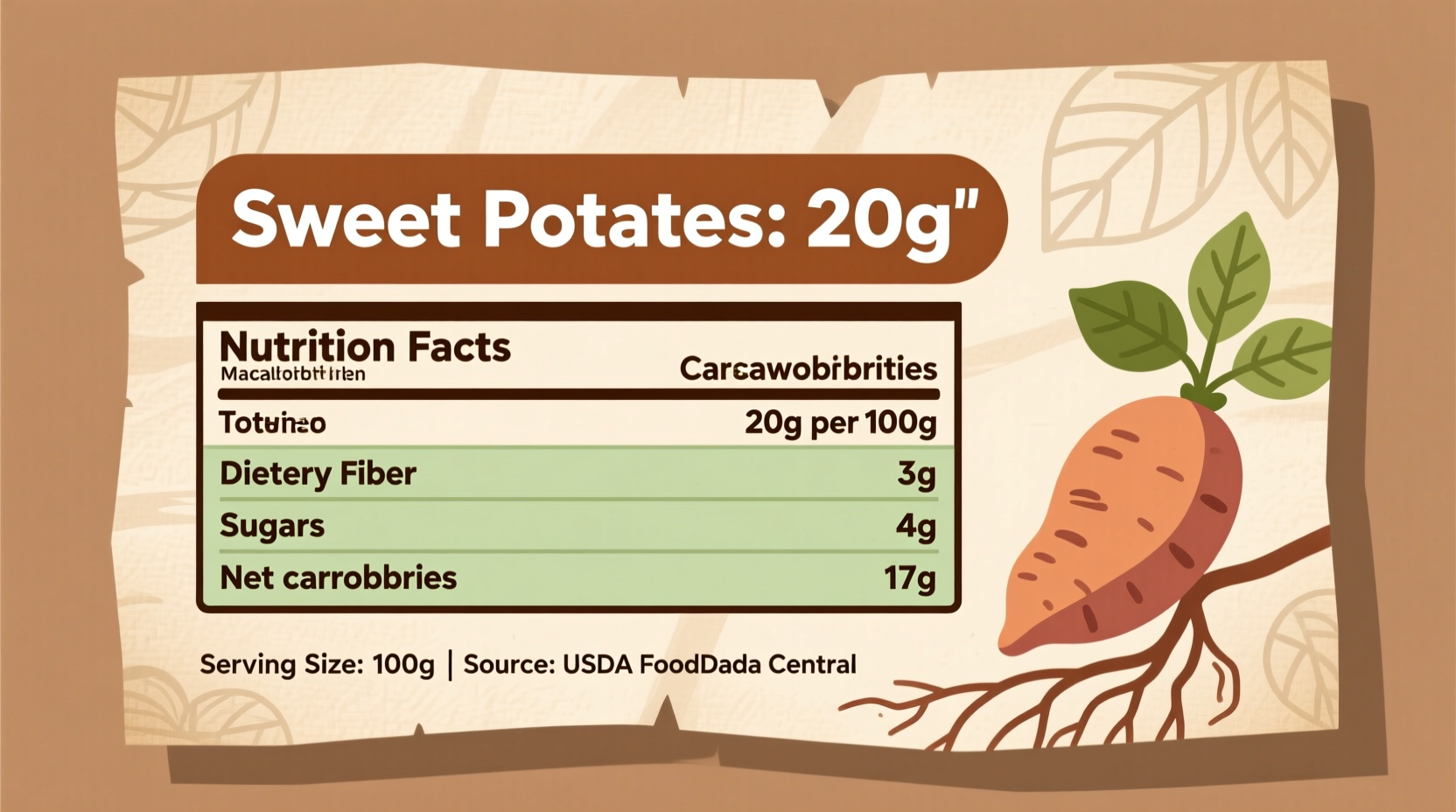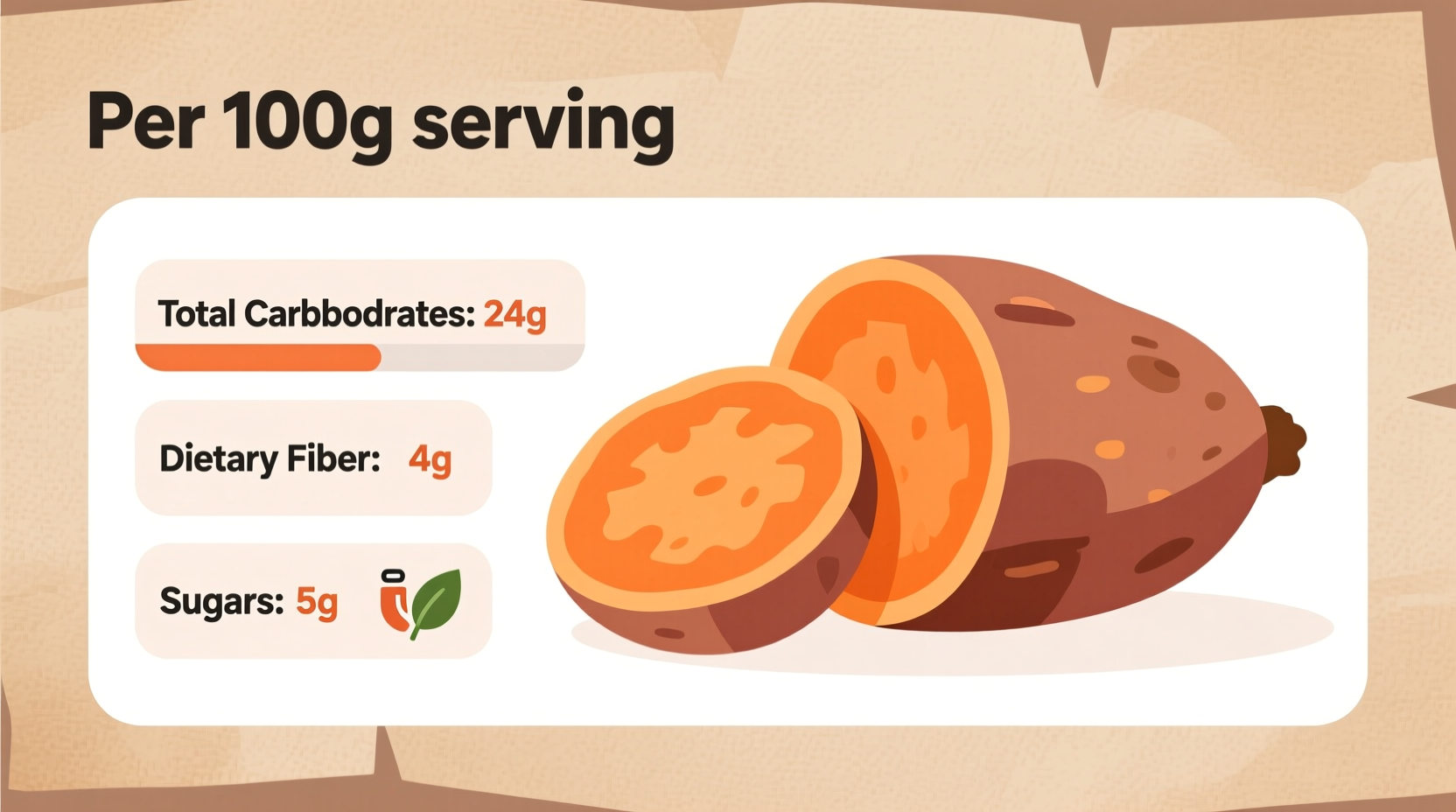Understanding the carbohydrate content in sweet potatoes is crucial for anyone managing their diet, whether for weight control, blood sugar management, or athletic performance. Unlike simple carbohydrates that cause blood sugar spikes, the complex carbs in sweet potatoes deliver steady energy while providing valuable nutrients like vitamin A, vitamin C, and fiber.
Breaking Down Sweet Potato Carbohydrates
When evaluating "how many carbs in sweet potato," it's essential to distinguish between total carbohydrates and net carbohydrates. Total carbs include all carbohydrate types, while net carbs subtract fiber and certain sugar alcohols that don't significantly impact blood sugar.
| Serving Size | Total Carbs | Dietary Fiber | Net Carbs | Sugars |
|---|---|---|---|---|
| 100g raw sweet potato | 20.1g | 3.0g | 17.1g | 4.2g |
| Medium sweet potato (130g) | 27g | 4g | 23g | 5.5g |
| 1 cup mashed (200g) | 41g | 6g | 35g | 8.4g |
This nutritional data comes from the USDA FoodData Central database, the most authoritative source for food composition information in the United States (fdc.nal.usda.gov). The values represent raw sweet potatoes; cooking methods can affect the final carb count.
How Preparation Affects Carb Content
Many people searching for "how many carbs in sweet potato" don't realize that preparation methods significantly impact the final nutritional profile. Understanding these context boundaries helps make informed dietary choices:
- Baking: Concentrates carbohydrates as water evaporates, increasing carb density per serving
- Boiling: May cause some water-soluble carbohydrates to leach into cooking water
- Roasting: Creates caramelization that transforms some complex carbs into simpler sugars
- Microwaving: Preserves most nutrients with minimal water loss

Sweet Potato Carbs Compared to Other Common Foods
When evaluating whether sweet potatoes fit your dietary needs, comparison to other carbohydrate sources provides valuable context. This factual comparison helps address related queries like "sweet potato carbs vs regular potato" and "are sweet potatoes high in carbs":
| Food (100g) | Total Carbs | Net Carbs | Glycemic Index |
|---|---|---|---|
| Sweet potato | 20.1g | 17.1g | 44-61 |
| White potato | 17.5g | 15.9g | 70-85 |
| White rice | 28.2g | 28.2g | 73 |
| Quinoa | 21.3g | 18.1g | 53 |
Despite having slightly more total carbohydrates than white potatoes, sweet potatoes have a lower glycemic index, meaning they cause a slower, more gradual rise in blood sugar. This makes them a better choice for blood sugar management, which addresses the common concern about whether "sweet potatoes are high in carbs" for diabetes management.
Practical Applications for Different Dietary Approaches
Understanding "how many carbs in sweet potato" becomes actionable when considering specific dietary contexts:
Keto Diet Considerations
For those following a ketogenic diet (typically 20-50g net carbs daily), a medium sweet potato would consume most of the daily carb allowance. However, smaller portions (½ cup or 75g) can sometimes fit within more liberal keto approaches while providing valuable nutrients often lacking in strict keto diets.
Diabetes Management
The American Diabetes Association recognizes sweet potatoes as a diabetes-friendly food when portion-controlled. Their high fiber content (about 4g per medium potato) helps moderate blood sugar response. Pairing sweet potatoes with protein and healthy fats further stabilizes blood glucose levels.
Athletic Performance
Athletes often include sweet potatoes in their nutrition plans for sustained energy. The complex carbohydrates provide glycogen stores needed for endurance activities. Many fitness professionals recommend consuming sweet potatoes 2-3 hours before intense workouts for optimal energy availability.
Maximizing Nutritional Benefits While Managing Carbs
You don't need to avoid sweet potatoes just because you're watching your carbohydrate intake. These practical strategies help you enjoy their nutritional benefits while managing carb consumption:
- Portion control: Stick to ½ to ⅔ cup servings if carb counting
- Cooling method: Let cooked sweet potatoes cool before eating to increase resistant starch content
- Pairing strategy: Combine with protein and healthy fats to slow carbohydrate absorption
- Preparation choice: Boiling retains more antioxidants than baking
Research published in the Journal of Agricultural and Food Chemistry shows that cooling cooked sweet potatoes increases their resistant starch content by up to 30%, which functions more like fiber than digestible carbohydrate (pubs.acs.org).
Common Misconceptions About Sweet Potato Carbs
Several myths persist about sweet potato carbohydrates that deserve clarification:
- Myth: Sweet potatoes are too high in sugar for healthy eating
Fact: While naturally sweet, their sugar content is moderate (about 4.2g per 100g), and comes with fiber and nutrients - Myth: All orange-fleshed sweet potatoes have identical carb profiles
Fact: Varieties differ significantly; Japanese sweet potatoes often have lower glycemic impact than orange varieties - Myth: Sweet potatoes will derail weight loss efforts
Fact: Their high fiber and nutrient density can support satiety and healthy weight management when portion-controlled
These clarifications address common follow-up questions people have after searching for "how many carbs in sweet potato," providing comprehensive value beyond the basic numerical answer.
Final Thoughts on Sweet Potato Carbohydrates
When evaluating sweet potatoes as part of your diet, remember that carbohydrate quality matters as much as quantity. The 27 grams of carbohydrates in a medium sweet potato come packaged with essential vitamins, minerals, and fiber that make them a nutritionally superior carbohydrate source compared to many alternatives. By understanding portion sizes, preparation methods, and how sweet potatoes fit within your overall dietary pattern, you can enjoy their benefits while managing your carbohydrate intake effectively.











 浙公网安备
33010002000092号
浙公网安备
33010002000092号 浙B2-20120091-4
浙B2-20120091-4